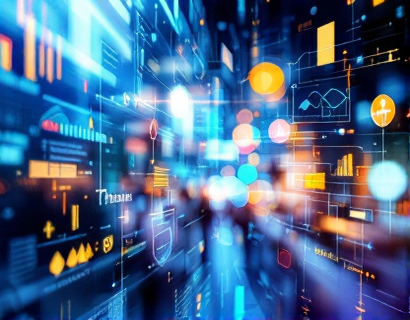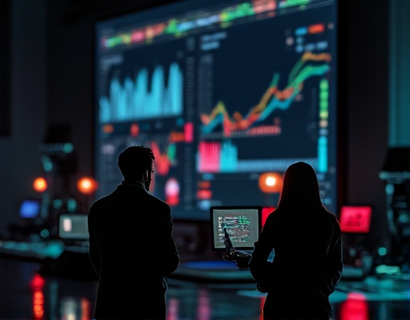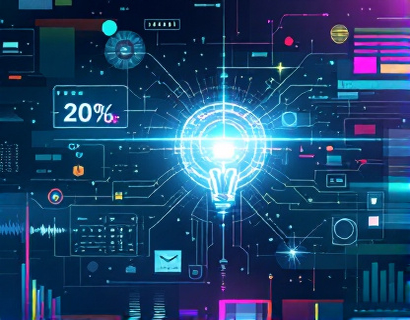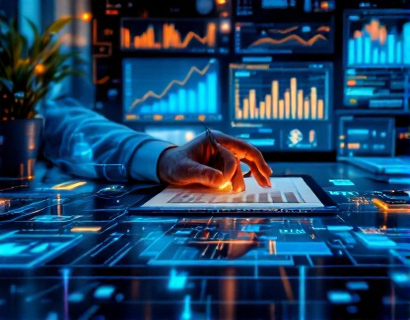Revolutionizing Digital Transformation: The Synergy of Crypto and AI
The intersection of cryptocurrency and artificial intelligence (AI) is catalyzing a new era of digital transformation, redefining how we interact with technology and each other. This synergy is not just about combining two powerful technologies but about creating a seamless, intelligent, and secure digital ecosystem that enhances user engagement and drives innovation. As tech-savvy individuals and professionals delve deeper into the realms of crypto and AI, it becomes increasingly clear that these technologies are not just evolving in isolation but are intertwining to create groundbreaking solutions.
Understanding the Basics: Cryptocurrency and AI
Cryptocurrency, often seen as digital or virtual currency, operates on blockchain technology, a decentralized ledger that ensures transparency, security, and immutability. Bitcoin, launched in 2009, was the first and most prominent cryptocurrency, but the space has since expanded to include thousands of altcoins, each with unique features and use cases. On the other hand, AI refers to the simulation of human intelligence processes by machines, particularly computer systems. These processes include learning (the acquisition of information and rules for using it), reasoning (using rules to reach approximate or definite conclusions), and self-correction.
When combined, cryptocurrency and AI leverage their respective strengths to create robust and intelligent systems. Cryptocurrency provides a secure and decentralized medium for transactions, while AI enhances these transactions through intelligent algorithms that can predict trends, optimize processes, and ensure security. This combination is particularly potent in the context of digital transformation, where businesses and individuals seek innovative solutions to enhance connectivity, growth, and user satisfaction.
The Role of Blockchain in Enhancing Trust and Security
Blockchain technology, the backbone of cryptocurrency, plays a crucial role in this synergy by providing a transparent and tamper-proof record of transactions. In the context of AI, blockchain can ensure that data used for training AI models is secure and unaltered, thereby enhancing the integrity of AI systems. This is particularly important in industries where data privacy and security are paramount, such as healthcare and finance.
For instance, in healthcare, AI can analyze vast amounts of patient data to predict diseases and personalize treatment plans. By using blockchain to manage this data, patient privacy is maintained, and the data's integrity is ensured. This not only builds trust among users but also complies with stringent regulatory requirements.
AI-Driven Optimization of Cryptocurrency Networks
AI is also revolutionizing cryptocurrency networks by optimizing their performance and security. Machine learning algorithms can monitor network activity in real-time, detecting and mitigating potential threats such as DDoS attacks or fraudulent transactions. This proactive approach to security is essential in a space where the stakes are high and the potential for misuse is significant.
Moreover, AI can enhance the efficiency of cryptocurrency networks by optimizing consensus mechanisms. For example, proof of work (PoW), used by Bitcoin, is energy-intensive. AI can help develop more efficient consensus algorithms, such as proof of stake (PoS), which reduce energy consumption while maintaining network security. This not only makes cryptocurrency more sustainable but also more appealing to a broader audience.
Enhancing User Engagement through Personalization
One of the most significant impacts of AI in the crypto space is the ability to personalize user experiences. AI algorithms can analyze user behavior, preferences, and market trends to provide tailored recommendations and insights. For instance, a crypto trading platform can use AI to suggest optimal trading strategies based on a user's historical trades and current market conditions. This level of personalization not only enhances user engagement but also increases the likelihood of successful trades.
Furthermore, AI-powered chatbots and virtual assistants can provide 24/7 customer support, answering queries and guiding users through complex processes. This not only improves user satisfaction but also reduces the workload on human support teams, making the service more efficient and cost-effective.
Decentralized Finance (DeFi) and AI
The rise of Decentralized Finance (DeFi) is another area where the combination of cryptocurrency and AI is making waves. DeFi platforms offer traditional financial services such as lending, borrowing, and trading without intermediaries, leveraging blockchain for transparency and security. AI can enhance DeFi by providing sophisticated risk management tools, fraud detection systems, and automated investment strategies.
For example, AI can analyze market data and predict price movements, helping users make informed decisions. Additionally, AI can optimize liquidity pools in decentralized exchanges, ensuring that assets are allocated efficiently and that trading is smooth and fast. This not only improves the user experience but also attracts more participants to the DeFi ecosystem.
Smart Contracts and AI: A Powerful Combination
Smart contracts, self-executing contracts with the terms directly written into code, are a cornerstone of blockchain technology. When combined with AI, smart contracts can become even more powerful and versatile. AI can be used to write more complex and adaptive smart contracts that can respond to changing conditions in real-time. This is particularly useful in automated agreements, where the terms of the contract can evolve based on predefined criteria and market conditions.
For instance, in supply chain management, AI-driven smart contracts can automatically trigger payments when specific conditions are met, such as the delivery of goods. This not only streamlines processes but also reduces the risk of disputes and delays.
Enhancing Connectivity and Interoperability
The integration of AI and cryptocurrency is also driving advancements in connectivity and interoperability within the digital ecosystem. Blockchain-based platforms are being developed to facilitate seamless interactions between different blockchain networks, allowing for cross-chain transactions and data sharing. AI can optimize these interactions by predicting network congestion, optimizing transaction routes, and ensuring that data is securely and efficiently transferred between networks.
This enhanced connectivity is crucial for building a truly interconnected digital world where different systems and platforms can work together harmoniously. It enables businesses to leverage the strengths of multiple technologies, creating more robust and resilient digital solutions.
User-Centric Design and AI-Driven UX
In the realm of digital transformation, user experience (UX) is paramount. AI plays a vital role in creating user-centric designs that cater to the diverse needs and preferences of users. By analyzing user interactions and feedback, AI can identify pain points and areas for improvement, enabling developers to create more intuitive and user-friendly interfaces.
For example, AI can be used to design adaptive user interfaces that adjust in real-time based on user behavior and context. This not only enhances usability but also increases user satisfaction and engagement. In the context of crypto and AI, this means that users can interact with complex financial tools and platforms with ease, making these technologies more accessible to a broader audience.
Challenges and Considerations
While the synergy between cryptocurrency and AI offers immense potential, it also comes with challenges that need to be addressed. One of the primary concerns is regulatory compliance. As both crypto and AI are rapidly evolving fields, regulatory frameworks are still catching up. Ensuring that AI-driven crypto solutions comply with existing laws and regulations is crucial to avoid legal issues and build trust with users.
Another challenge is the technical complexity involved in integrating these technologies. Developing robust and secure systems that leverage the strengths of both crypto and AI requires expertise in multiple domains. This can be a barrier for smaller players in the market, but it also presents opportunities for innovative solutions that can disrupt traditional models.
Future Prospects: The Path Forward
The future of the crypto and AI synergy is bright, with numerous opportunities for growth and innovation. As technology continues to advance, we can expect to see more sophisticated AI algorithms that can handle complex tasks with greater accuracy and efficiency. This will further enhance the capabilities of cryptocurrency networks and DeFi platforms, making them more reliable and user-friendly.
Moreover, the increasing adoption of blockchain and AI in various industries will drive demand for more integrated and intelligent solutions. This will not only benefit tech enthusiasts but also businesses and individuals seeking to harness the power of these technologies to stay competitive and innovative.
In conclusion, the combination of cryptocurrency and AI is revolutionizing digital transformation by creating secure, intelligent, and user-centric solutions. As the tech landscape evolves, the synergy between these technologies will continue to drive growth, enhance user engagement, and shape the future of digital experiences.










































